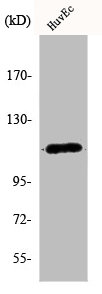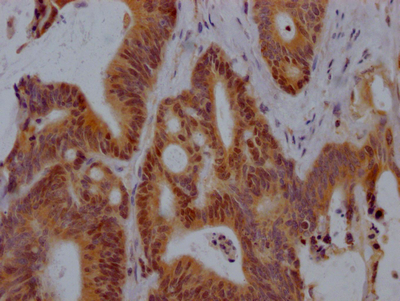KCNH1 Antibody
-
货号:CSB-PA003093
-
规格:¥880
-
图片:
-
其他:
产品详情
-
Uniprot No.:O95259
-
基因名:KCNH1
-
别名:EAG antibody; EAG channel 1 antibody; EAG1 antibody; Ether a go go potassium channel 1 antibody; Ether a go go, Drosophila, homolog of antibody; Ether-a-go-go potassium channel 1 antibody; ether-a-go-go, Drosophila, homolog of antibody; h eag antibody; h-eag antibody; hEAG1 antibody; Kcnh1 antibody; KCNH1_HUMAN antibody; Kv10.1 antibody; M eag antibody; MGC124419 antibody; MGC124420 antibody; MGC142269 antibody; Potassium voltage gated channel subfamily H (eag related), member 1 antibody; Potassium voltage gated channel subfamily H member 1 antibody; Potassium voltage-gated channel subfamily H member 1 antibody; Voltage gated potassium channel subunit Kv10.1 antibody; Voltage-gated potassium channel subunit Kv10.1 antibody
-
宿主:Rabbit
-
反应种属:Human,Mouse,Rat
-
免疫原:Synthesized peptide derived from the Internal region of Human KCNH1.
-
免疫原种属:Homo sapiens (Human)
-
标记方式:Non-conjugated
-
抗体亚型:IgG
-
纯化方式:The antibody was affinity-purified from rabbit antiserum by affinity-chromatography using epitope-specific immunogen.
-
浓度:It differs from different batches. Please contact us to confirm it.
-
保存缓冲液:Liquid in PBS containing 50% glycerol, 0.5% BSA and 0.02% sodium azide.
-
产品提供形式:Liquid
-
应用范围:WB, ELISA
-
推荐稀释比:
Application Recommended Dilution WB 1:500-1:2000 ELISA 1:5000 -
Protocols:
-
储存条件:Upon receipt, store at -20°C or -80°C. Avoid repeated freeze.
-
货期:Basically, we can dispatch the products out in 1-3 working days after receiving your orders. Delivery time maybe differs from different purchasing way or location, please kindly consult your local distributors for specific delivery time.
相关产品
靶点详情
-
功能:Pore-forming (alpha) subunit of a voltage-gated delayed rectifier potassium channel. Channel properties are modulated by subunit assembly. Mediates IK(NI) current in myoblasts. Involved in the regulation of cell proliferation and differentiation, in particular adipogenic and osteogenic differentiation in bone marrow-derived mesenchymal stem cells (MSCs).
-
基因功能参考文献:
- the overexpression of Eag1 might be associated with an increased risk of progression to breast cancer PMID: 28070819
- A role of Kv10.1 in coordinating primary cilium disassembly with cell cycle progression through localized changes of membrane potential at the ciliary base is proposed [REVIEW]. PMID: 28370099
- in this report, we present two independent screening campaigns in which we wanted to identify small molecules that bind to either the intracellular cytoplasmic amino terminal Per-Arnt-Sim (PAS) domain from the human EAG-related gene (ERG) channel or the amino or carboxy terminal globular domains from the mouse EAG1 channel, affecting their interaction. PMID: 26975997
- REVIEW: Kv10.1 potassium channel: role from the brain to the tumors PMID: 28708947
- Crystal structure of the PAS domain of the hEAG potassium channel has been presented. PMID: 27487920
- KV10.1 localizes to the centrosome and the primary cilium and promotes ciliary disassembly. Interference with KV10.1 ciliary localization abolishes not only the effects on ciliary disassembly, but also KV10.1-induced tumor progression in vivo Conversely. PMID: 27113750
- Mibefradil binds to the voltage sensor domain of Kv10.1 channels, modifying the gating of the channels in a way that in some, but not all, aspects opposes the gating effects exerted by divalent cations. PMID: 27255432
- Eag1 potassium channels and miR34a are involved in the response to rotenone-induced injury in SHSY5Y cells. PMID: 28259991
- Simulations with the inactivation-enhancing mutant Y464A or Na(+) ions lead to trapped water molecules behind the SF, suggesting that these simulations captured early conformational changes linked to C-type inactivation PMID: 28109880
- The human EAG1 (hEAG1) channel is remarkably sensitive to inhibition by intracellular calcium (Ca(2+) i) through binding of Ca(2+)-calmodulin to three sites adjacent to the eagD and cNBHD. PMID: 27325704
- Structural, biochemical, and functional analysis of the calmodulin (CaM) binding sites within the EAG1 channel suggests that the molecular change induced by CaM and underlying channel inhibition occurs locally. PMID: 27618660
- Our report confirms that KCNH1 mutations are associated with syndromic neurodevelopmental disorder, and also support the functional importance of the S4 domain. PMID: 26818738
- Epilepsy is a key phenotypic feature in most individuals with KCNH1-related syndromes, suggesting a direct role of KCNH1 in epileptogenesis, although the underlying mechanism is not understood. PMID: 27267311
- Findings show that the hEAG1 channel is directly regulated by PIP2 and that this regulation may contribute to normal human physiology and pathology. PMID: 27005320
- direct link between hERG 1b mutation and cardiomyocyte dysfunction PMID: 26772437
- Expression of Kv10.1 driven by phosphorylated Rb/E2F1 contributes to G2/M progression of cancer and non-transformed cells. PMID: 27029528
- Eag1 may serve as a potential indicator to predict tumor cell chemosensitivity. Silencing Eag1 may represent a potential therapeutic strategy to increase ovarian cancer sensitivity to cisplatin. PMID: 26079730
- The expression of Eag1 may be partially explained the aggressive behavior of triple negative breast cancer in the breast cancer tissue. PMID: 26823849
- Our data indicated that Eag1 promotes osteosarcoma proliferation and migration, at least in part, by targeting STAT3-VEGF pathway. PMID: 26783521
- Alternatively Spliced Isoforms of KV10.1 Potassium Channels Modulate Channel Properties and Can Activate Cyclin-dependent Kinase PMID: 26518875
- Repression by calcitriol occurs at the transcriptional level and involves a functional negative vitamin D response element (nVDRE) E-box type in the hEAG1 promoter. PMID: 25495694
- Astemizole might have clinical utility for HCC prevention and treatment, and Eag1 channels may be potential early Hepatocellular carcinoma biomarkers PMID: 25783527
- KCNH1 mutations cause Zimmermann-Laband syndrome. PMID: 25915598
- These results suggest that Eag1 plays an important role in regulating the proliferation and cell cycle of liposarcoma cells PMID: 25136578
- De novo KCNH1 mutations in exons 6 and 8 in Temple-Baraitser syndrome showed a decreased threshold of activation and delayed deactivation, leading to deleterious gain of function. PMID: 25420144
- the Eag1 channel plays a crucial role in regulating the proliferation and cell cycle of osteosarcoma cells, and represents a new and effective therapeutic target for osteosarcoma. PMID: 24694542
- hERG and hEAG channels are regulated by Src and by SHP-1 tyrosine phosphatase via an ITIM region in the cyclic nucleotide binding domain. PMID: 24587194
- Progesterone induced KCNH1 mRNA and protein expression in cells transfected with human progesterone receptor-B. PMID: 24062569
- The roles of Kv10.1 in oncology and the mechanisms that are responsible for its aberrant expression in tumor cells. [Review] PMID: 24336491
- our results suggest that miR-34a could inhibit osteosarcoma growth via the down regulation of Eag1 expression. PMID: 23569431
- Eag1 K+ channel and ErbB were expressed in all human pituitary adenomas examined while ErbB2 expression was more variable. PMID: 23413122
- The functional state of KCNH1 channels is determined by the oxidative status of these linkers that provide an additional dimension of channel regulation. PMID: 22310694
- Cortactin controls surface expression of the voltage-gated potassium channel K(V)10.1. PMID: 23144454
- MiR-296-3p regulates cell growth and multi-drug resistance of human glioblastoma by targeting ether-a-go-go (EAG1). PMID: 22999387
- calcitriol antiproliferative effects by downregulating CYP24A1, upregulating vitamin D receptor (VDR) and targeting Eag1. PMID: 22984610
- hEAG1 expression is a biologically relevant feature that promotes cell proliferation and invasion, although independently of its ion-conducting function. PMID: 22466864
- Mutation Y464A in the S6 segment leads to EAG1 inactivation that can be prevented by additional mutations located in the S5 segment (F359A) or pore helix (L434A). PMID: 22930803
- Silencing of Rabaptin-5 induces down-regulation of recycling of K(V)10.1 channel in transfected cells and reduction of K(V)10.1 current density in cells natively expressing K(V)10.1, indicating a role of Rabaptin-5 in channel trafficking. PMID: 22841712
- Human Eag1 may represent a target for the suppression of breast cancer cell migration, and thus prevention of metastasis development. PMID: 22495877
- inhibition of either expression or activity of Eag1 leads to reduced proliferation of cancer cells, making Eag1 a potential anticancer target. Using Eag1 in cancer detection programs could help to reduce mortality from this disease PMID: 22778627
- KCNH1-encoded human hEAG1 potassium channel plays an important role in regulating the proliferation of induced pluripotent stem cells (PSC)-mesenchymal stem cells (MSCs) and bone marrow (BM)-MSCs. PMID: 22357737
- Overexpression of potassium channel ether a go-go is associated with osteosarcoma. PMID: 22248279
- These results demonstrate that hEAG1 channel activity is regulated by EGFR kinase at the tyrosine residues Tyr90, Try344, and Try485. PMID: 22061963
- We suggest Eag1 as a potential marker of cervical dysplasia and a risk indicator for developing cervical lesions in patients taking estrogens PMID: 21887469
- K(V)10.1 channels at the nuclear envelope might participate in the homeostasis of nuclear K(+), or indirectly interact with heterochromatin, both factors known to affect gene expression PMID: 21559285
- Data suggest that to avoid the potential harmful side effect, hERG channel toxicity needs to be assessed in a timely and efficient fashion. PMID: 21320466
- High EAG1 potassium channels is associated with epithelial-to-mesenchymal transition in lung cancer. PMID: 21508374
- This study is the first to demonstrate that K(+) channels such as hEag1 are directly involved in the IGF-1-induced up-regulation of cyclin D1 and E expression in MCF-7 cells. PMID: 21315112
- a role for Eag as a prognostic marker for survival in patients with ovarian cancer PMID: 21138547
- This study suggests that the SNPs within the kcnh1 genes we examined do not play a major role in schizophrenia in the Han Chinese population. PMID: 20933057
显示更多
收起更多
-
相关疾病:Temple-Baraitser syndrome (TMBTS); Zimmermann-Laband syndrome 1 (ZLS1)
-
亚细胞定位:Cell membrane; Multi-pass membrane protein. Nucleus inner membrane; Multi-pass membrane protein. Cell projection, dendrite. Cell projection, axon. Cell junction, synapse, presynaptic cell membrane. Perikaryon. Cell junction, synapse, postsynaptic density membrane. Early endosome membrane. Note=Perinuclear KCNH1 is located to NPC-free islands.
-
蛋白家族:Potassium channel family, H (Eag) (TC 1.A.1.20) subfamily, Kv10.1/KCNH1 sub-subfamily
-
组织特异性:Highly expressed in brain and in myoblasts at the onset of fusion, but not in other tissues. Detected in HeLa (cervical carcinoma), SH-SY5Y (neuroblastoma) and MCF-7 (epithelial tumor) cells, but not in normal epithelial cells.
-
数据库链接:
HGNC: 6250
OMIM: 135500
KEGG: hsa:3756
STRING: 9606.ENSP00000271751
UniGene: Hs.553187
Most popular with customers
-
YWHAB Recombinant Monoclonal Antibody
Applications: ELISA, WB, IF, FC
Species Reactivity: Human, Mouse, Rat
-
-
-
-
-
-
-





















